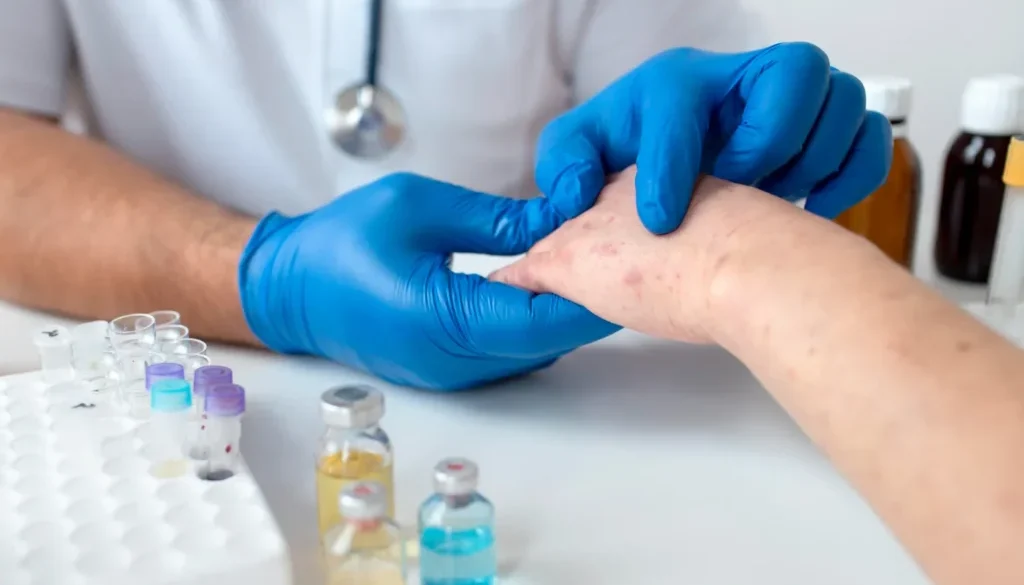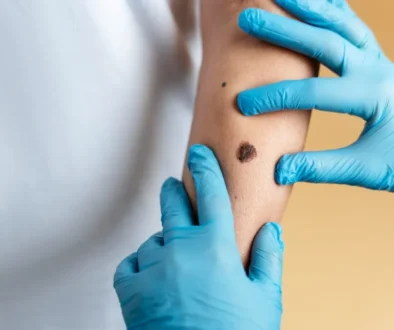Skin Rash in Sharjah
Understanding Skin Rashes and Treatments
Our skin functions as a protective shield against external elements. But sometimes, that barrier gets irritated or inflamed, leading to the dreaded skin rash. Rashes can be anything from a minor annoyance to an indicator of a more serious underlying condition. In Sharjah, issues like eczema, psoriasis, and various types of skin allergy(skin rash) are prevalent concerns. It’s crucial to address these conditions promptly and effectively. Our Lifeline Clinic, with the expertise of the best general practitioner, Dr. Abhi Mohan, offers personalized care and treatment for various skin conditions, ensuring optimal skin health and well-being.
What is a Skin Rash?
A skin rash is a clear change in how the skin feels or looks or colour of your skin. It can appear anywhere on the body and vary depending on the cause. Rashes can be acute (short-term) or chronic (long-term) and may present differently in terms of severity, colour, and texture. Common examples include eczema, hives, and contact dermatitis.
Causes of Skin Rashes
Skin rashes can arise from various factors, such as:
- Allergic Reactions: Exposure to allergens like certain foods, medications, or plants can trigger rashes.
- Infections: Rashes can be triggered by bacterial, viral, or fungal infections, such as impetigo, chickenpox, or ringworm.
- Autoimmune Disorders: Conditions like lupus or psoriasis happens when the immune system wrongly targets the skin.
- Environmental Factors: Extreme temperatures, humidity, or irritants like soaps and detergents can lead to rashes.
- Medications: Some drugs can cause rashes as a side effect.
- Stress: Emotional stress can exacerbate skin conditions, leading to rashes.
Symptoms of Skin Rashes
Symptoms of skin rashes can vary widely but commonly include:
- Redness or discoloration
- Itching or burning sensation
- Swelling or inflammation
- Dry, scaly, or flaky skin
- Blisters or pustules
- Pain or discomfort
Types of Skin Rashes
Skin allergy appear in different shapes and types, each with distinct characteristics and causes. Here are some common types of skin allergy:
- Atopic Dermatitis (Eczema): A long-lasting condition marked by dry, itchy, and swollen skin. It frequently emerges in patches and can be prompted by allergens, irritants, stress, or environmental factors.
- Contact Dermatitis: Happens when the skin encounters an irritant or allergen directly, resulting in redness, itching, and sometimes blisters. It is categorized into irritant contact dermatitis and allergic contact dermatitis.
- Psoriasis: An autoimmune condition resulting in thick, scaly patches of skin, often on the elbows, knees, and scalp. It is caused by an overactive immune system that speeds up skin cell turnover.
- Hives (Urticaria): Raised, itchy welts that can appear anywhere on the body. Hives are usually a result of an allergic reaction to food, medication, or other allergens.
- Seborrheic Dermatitis :Affects oily areas of the body like the scalp, face, and chest, causing red, scaly, and itchy patches. It is often related to overactive sebaceous glands and yeast on the skin.
Understanding the type of rash you have can help you seek the appropriate treatment and management strategies. Therefore if you are uncertain about the type of skin rash or its cause, consulting our healthcare professional in Sharjah is essential.
Treatment of Skin Rashes
Treatment depends on the underlying cause. Common treatments in Sharjah include:
- Topical Creams and Ointments: Over-the-counter or prescription creams or antibiotics can help reduce inflammation and itching.
- Oral Medications: Antibiotics may be prescribed for more severe cases.
- Phototherapy: For chronic conditions like psoriasis, light therapy can be beneficial.
- Moisturizers: Regular application of moisturizers can soothe dry and irritated skin.
How to Avoid Skin Rashes
Identify and avoid irritants: Pay attention to what triggers your rashes and avoid those substances.
Moisturize regularly: Keeping your skin well-hydrated creates a strong barrier against irritants.
Wear protective clothing: When handling harsh chemicals, wear gloves and protective clothing.
Manage stress: Stress can worsen skin conditions such as eczema and psoriasis.
When to See a Doctor
It is important to consult our doctor in Sharjah for skin rash treatment if you experience any of the following:
- Rash that spreads quickly or covers large areas of the body
- Severe pain or discomfort
- Indications of infection, like pus, fever, or swelling
- Persistent or recurring rashes
- Symptoms that interfere with daily activities
Frequently Asked Questions
Are all skin rashes contagious?
- No, only rashes caused by infections, like impetigo or chickenpox, are contagious.
Can diet affect skin rashes?
- Yes, certain foods can trigger allergic reactions or worsen conditions like eczema.
Can natural remedies completely cure skin rashes?
- While natural remedies can alleviate symptoms,it’s crucial to tackle the root cause, which may require medical treatment.
Are children more susceptible to skin rashes than adults?
- Yes, children are often more susceptible to skin rashes due to their developing immune systems and frequent exposure to new allergens and irritants.
Can pets cause skin rashes?
- Yes, pets can be a source of allergens (such as dander) and carry irritants like fleas or mites, which can cause skin rashes in sensitive individuals. Consistently grooming and keeping the environment clean can aid in lowering this risk.
While skin rashes can be frustrating, understanding the causes and treatment options empowers you to manage them effectively. If your rash persists, worsens, or is accompanied by other concerning symptoms, don’t hesitate to consult your doctor for proper diagnosis and treatment. Keep in mind, caring for your skin is crucial for overall health and well-being. Stay informed and proactive to maintain healthy, rash-free skin.


